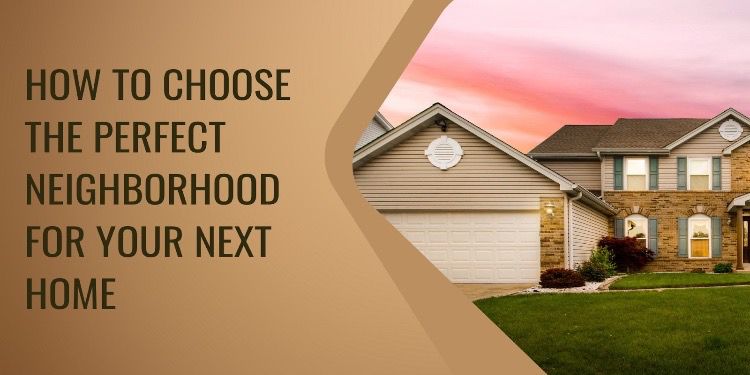When it comes to buying a home, the neighborhood you choose is just as important as the property itself. A neighborhood is more than just a geographical area—it’s where you establish your daily routines, build relationships, and create lasting memories. The right neighborhood not only impacts your quality of life but also serves as a cornerstone of your financial investment. Finding the ideal community requires careful thought, thorough research, and often, a bit of intuition. From considering your lifestyle priorities to analyzing local amenities and safety, every decision you make will shape your overall experience as a homeowner. This guide will take you through the key factors to consider, helping you navigate the complexities of choosing the perfect neighborhood and ensuring your next move feels like home in every sense of the word.
1. Understand Your Lifestyle and Priorities
Before diving into the details of potential neighborhoods, take a moment to assess your lifestyle and what matters most to you. Your ideal neighborhood should reflect your personal and professional needs while supporting your hobbies and interests. For instance, if you have a family or plan to start one, a quiet, family-friendly area with quality schools and parks may be a priority. Conversely, young professionals may prefer urban settings with vibrant nightlife, dining options, and cultural activities.
Think about your daily routines. Do you need to be close to work or public transportation? Are you someone who thrives in nature, requiring access to trails or green spaces? Write down your “must-haves” and “nice-to-haves,” such as proximity to gyms, supermarkets, or entertainment hubs. This list will be your guiding star as you explore different neighborhoods. Defining your lifestyle needs and priorities early can save time and prevent future regret.
2. Research the Local Real Estate Market
A thorough understanding of the local real estate market is essential to making an informed decision. “Start by checking the average home prices in your desired neighborhoods to ensure they align with your budget. Areas with steadily increasing property values signal a strong and stable housing market, making them good investment options. Additionally, researching property taxes and potential homeowner association (HOA) fees can help you avoid unexpected costs,” says Sandra Malouf, President of Eurolog Packing Group.
Beyond current prices, consider the neighborhood’s growth potential. Are there any new infrastructure projects, schools, or commercial developments planned? These factors can significantly boost property values over time. Online tools like Zillow, Realtor.com, or local MLS services can provide valuable insights into market trends. Speak to local realtors for expert advice on whether a neighborhood’s market conditions are favorable for buyers. Taking these steps ensures that your new home isn’t just a place to live but also a smart financial investment.
3. Check Safety and Crime Rates
“Safety is one of the most critical factors when choosing a neighborhood. A safe environment ensures peace of mind and allows you and your family to thrive without constant worry. Start by researching crime rates in the area using websites like NeighborhoodScout or CrimeMapping,” says Arvind Rongala, CEO of Invensis Learning. These platforms provide detailed crime statistics, helping you identify areas with low crime levels.
However, numbers don’t tell the whole story. Visit the neighborhood at different times of the day and night to gauge its overall safety. Observe the lighting, the presence of people walking around, and whether the area feels inviting. Additionally, speak to local residents or law enforcement to gather firsthand accounts of safety concerns. Knowing that your new home is in a secure area can enhance your overall living experience and provide long-term peace of mind.
4. Explore Local Amenities and Services
Convenience is a major factor in day-to-day happiness, and the availability of local amenities plays a big role in determining the suitability of a neighborhood. Proximity to essential services like grocery stores, healthcare facilities, and schools can save you time and effort. Recreational amenities like parks, gyms, and cultural hubs can also enrich your lifestyle.
“Spend time exploring the neighborhood to experience its offerings firsthand. Check out the local supermarket to see if it meets your needs, visit nearby parks to gauge their usability, and explore dining or entertainment options to ensure they align with your preferences. For families, the presence of playgrounds and daycare centers might be essential,” says Jessica Wright, Owner of Buy My Home Chattanooga. Additionally, pay attention to how well-maintained these amenities are, as it reflects the community’s overall quality. Choosing a neighborhood rich in amenities ensures a more comfortable and fulfilling life.
5. Trust Your Instincts
While research and data are critical, don’t underestimate the power of your instincts when choosing a neighborhood. How you feel when visiting an area can be a strong indicator of whether it’s the right fit for you. Pay attention to the vibe of the neighborhood. Does it feel welcoming? Are the streets clean and well-maintained? Are people friendly and approachable?
Also, watch out for red flags. Poorly maintained properties, high turnover rates, or an unwelcoming atmosphere can indicate underlying issues. Trust your gut if something doesn’t feel right. On the other hand, if you feel an immediate connection to the area and can envision yourself living there, it’s worth giving it serious consideration. Remember, data can guide your decision, but your instincts ensure that you’ll feel at home in your new community.
Conclusion
Choosing the perfect neighborhood is not just about ticking boxes; it’s about envisioning your future and finding a place where you can truly thrive. From assessing your lifestyle priorities to exploring safety and amenities, each step you take brings you closer to finding your ideal community. Remember, your neighborhood isn’t just where you reside—it’s where you connect with others, grow as an individual or family, and create lasting memories. While data and logic are vital, your intuition often reveals what feels like home. Take the time to immerse yourself in potential neighborhoods, trust your instincts, and think long-term about your needs and aspirations. With careful planning and a thoughtful approach, you can make a confident decision that brings both joy and security. Happy house hunting, and may you find a neighborhood that perfectly complements your dream home!


![7 Best POS Software in the UK [2026 Edition]](https://todaynews.co.uk/wp-content/uploads/2026/02/7-Best-POS-Software-in-the-UK-2026-Edition-360x180.png)








































































